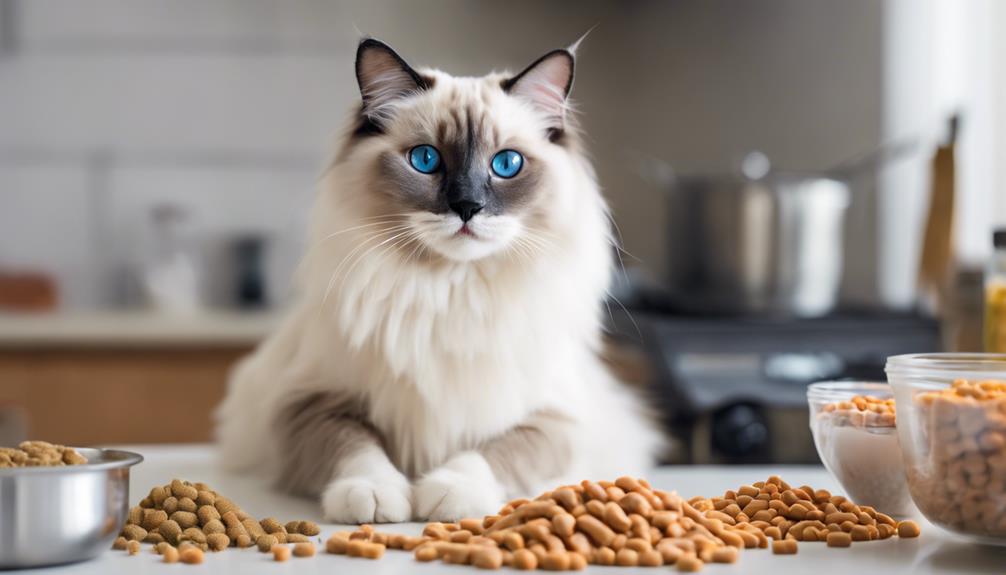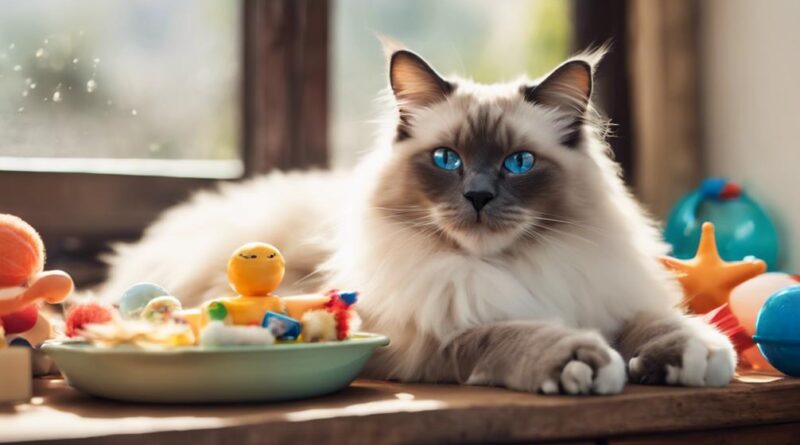9 Best Factors Affecting Ragdoll Cats Lifespan
Are you curious about what truly impacts the lifespan of your beloved Ragdoll cat? Understanding the nine key factors that can affect how long your feline companion thrives is essential.
From genetics to weight management, these elements play a vital role in determining the longevity and well-being of your Ragdoll. Each factor contributes in its unique way, influencing your cat's health and quality of life.
By exploring these factors, you can ensure that your Ragdoll enjoys a happy and healthy life by your side.
Genetics
Genetics play a crucial role in determining a Ragdoll cat's lifespan. When it comes to Ragdolls, certain health risks are associated with specific genetic factors. Responsible breeding practices can help mitigate these risks and promote a longer and healthier life for your feline companion.
Health risks in Ragdoll cats can stem from genetic predispositions to certain conditions. Heart issues, such as hypertrophic cardiomyopathy, are one of the most common concerns. This genetic heart condition can affect Ragdolls and potentially shorten their lifespan if not managed properly. Additionally, kidney diseases like polycystic kidney disease, which is hereditary in some Ragdoll lines, can impact their overall health and longevity.
Breeding practices play a significant role in addressing these health risks. Reputable breeders conduct thorough genetic testing to identify potential issues and avoid passing them on to future generations. By selecting breeding pairs carefully and responsibly, breeders can reduce the likelihood of genetic health problems in Ragdoll cats. This approach not only improves the overall quality of the breed but also contributes to extending the lifespan of these majestic cats.
Diet
To promote a longer and healthier lifespan for your Ragdoll cat, the diet you provide plays a crucial role in their overall well-being. Meeting their nutritional needs is essential. Ragdoll cats require a balanced diet rich in protein, essential fatty acids, vitamins, and minerals. Choose high-quality cat food that's specifically formulated for Ragdolls to ensure they receive the necessary nutrients for optimal health.
When it comes to meal portions, it's important to feed your Ragdoll cat the right amount of food to maintain a healthy weight. Overfeeding can lead to obesity, which can result in various health issues and potentially shorten their lifespan. On the other hand, underfeeding can cause nutritional deficiencies and impact their overall well-being. Consult with your veterinarian to determine the appropriate meal portions based on your cat's age, weight, and activity level.
Exercise
Maintaining a consistent exercise routine is vital for enhancing the lifespan and overall well-being of your Ragdoll cat. Playtime routines are crucial for keeping your feline friend active and mentally stimulated. Engaging in interactive play sessions not only helps your cat to burn off excess energy but also strengthens the bond between you and your pet. Consider incorporating toys that encourage your Ragdoll to jump, chase, and pounce, mimicking their natural hunting instincts.
In addition to indoor play, outdoor adventures can provide valuable exercise opportunities for your Ragdoll cat. Safely allowing your cat to explore a secure outdoor space can offer mental stimulation and physical exercise. However, always supervise your cat during outdoor excursions to ensure their safety and prevent them from encountering potential hazards.
Regular exercise helps to prevent obesity, which can lead to various health issues in Ragdoll cats. By promoting an active lifestyle through playtime routines and outdoor adventures, you can help your cat maintain a healthy weight and reduce the risk of developing obesity-related conditions. Remember that each cat has different exercise needs, so it's essential to tailor the activities to suit your Ragdoll's individual preferences and abilities.
Veterinary Care
Regular veterinary check-ups are essential for ensuring the health and well-being of your Ragdoll cat. By scheduling routine appointments with your veterinarian, you can address any potential health issues early on, increasing the chances of successful treatment and improving your cat's overall quality of life. During these check-ups, preventive measures such as vaccinations, parasite control, and dental care can be discussed and implemented to keep your Ragdoll cat healthy.
In addition to regular check-ups, it's crucial to be prepared for emergency situations that may arise. Knowing the nearest 24-hour veterinary clinic and having a list of emergency contact numbers can make a significant difference in critical moments. As a responsible Ragdoll cat owner, being proactive and informed about emergency procedures can help you act swiftly and effectively if your cat requires urgent medical attention.
When it comes to veterinary care, prevention is key. Alongside regular check-ups and emergency preparedness, maintaining open communication with your veterinarian is paramount. By discussing any concerns or changes in your Ragdoll cat's behavior promptly, you can work together to provide the best possible care for your feline companion. Remember, a proactive approach to veterinary care can contribute significantly to your Ragdoll cat's longevity and well-being.
Environment
Ensure your Ragdoll cat's environment is conducive to their health and longevity by providing a safe and enriching space for them to thrive. Here are some key factors to consider:
- Temperature Regulation: Ragdoll cats are sensitive to extreme temperatures. Keep your home at a comfortable temperature range, ideally between 65-80°F (18-27°C), to ensure your cat doesn't get too hot or too cold. Provide cozy blankets or beds in warm spots during winter and cool areas during summer to help them regulate their body temperature effectively.
- Social Interaction: Ragdolls are known for their affectionate and social nature. Make sure to spend quality time with your cat daily. Engage in interactive play sessions, gentle petting, and verbal communication to nurture your bond. Consider getting another pet for companionship if your Ragdoll seems lonely when you're away. Social interaction is vital for their mental stimulation and overall well-being.
- Safe Environment: Create a safe indoor environment for your Ragdoll cat by removing any toxic plants, securing windows and balconies, and keeping small objects that could be swallowed out of reach. Provide scratching posts, climbing structures, and hiding spots to satisfy their natural instincts and keep them physically active. A secure, stimulating environment will help prevent accidents and promote a happy, healthy life for your beloved feline friend.
Stress Levels
To promote a healthy lifespan for your Ragdoll cat, managing their stress levels is crucial for their well-being and longevity. Just like humans, cats can experience stress, which can lead to various behavioral changes and health implications if not addressed promptly.
Behavioral changes in Ragdoll cats due to stress can manifest in different ways. They may become more withdrawn, exhibit aggressive tendencies, or develop destructive behaviors like excessive scratching or urinating outside the litter box. These changes can't only affect their quality of life but also indicate underlying stress that needs to be managed effectively.
High stress levels in Ragdoll cats can have significant health implications. Chronic stress weakens the immune system, making them more susceptible to illnesses and diseases. It can also lead to gastrointestinal issues, skin problems, and even contribute to obesity. By keeping your Ragdoll cat's stress levels in check, you can help prevent these health issues and ensure they lead a happy and healthy life.
Weight Management

Managing your Ragdoll cat's weight is essential for their overall health and longevity. Here are some key factors to consider:
- Portion Control: Ensuring your Ragdoll cat receives the right amount of food is crucial in maintaining a healthy weight. Avoid overfeeding and follow the feeding guidelines provided by your veterinarian. Consider feeding measured portions at specific times of the day to regulate calorie intake.
- Activity Level: Encouraging regular exercise can help your Ragdoll cat stay fit and prevent obesity. Provide toys, climbing structures, or interactive play sessions to keep them active. Engaging in physical activities not only helps in weight management but also promotes mental stimulation and overall well-being.
- Monitoring Weight: Regularly monitoring your Ragdoll cat's weight is essential to track their progress. Sudden weight gain or loss could indicate underlying health issues that need to be addressed promptly. Consult your veterinarian if you notice any significant changes in your cat's weight.
Neutering
Regularly neutering your Ragdoll cat is a crucial aspect of their care that can impact various aspects of their health and well-being. Neutering plays a significant role in maintaining hormonal balance in your cat. When male Ragdoll cats are neutered, it helps reduce the production of testosterone, which can't only prevent certain health issues but also influence their behavior positively. Neutering female Ragdoll cats can help regulate their estrogen levels, potentially reducing the risk of certain cancers and uterine infections.
Apart from hormonal balance, neutering can also lead to behavioral changes in Ragdoll cats. Neutered male cats tend to be less aggressive and have a reduced tendency to roam or mark their territory with urine. This can result in a more peaceful and harmonious environment for both your cat and your household. Neutered female cats may display less yowling and restlessness during heat cycles, making them more content and easier to manage.
Frequently Asked Questions
How Do Ragdoll Cats Typically React to Changes in Their Living Environment?
When it comes to changes in their living environment, Ragdoll cats generally display notable behavioral adaptation skills. They can adjust well to new surroundings, making living adjustments with ease.
Stress management is crucial for them during environmental changes, so providing a stable and familiar environment can help them cope better. By observing their reactions and offering support, you can help your Ragdoll cat navigate transitions smoothly.
Are There Any Common Health Issues Specific to Ragdoll Cats That Could Affect Their Lifespan?
Common health issues specific to ragdoll cats may impact their lifespan. Regular checkups and preventative care play a crucial role. Diet management and exercise routines are also key factors to consider.
What Are Some Signs That a Ragdoll Cat May Be Experiencing Stress, and How Can It Be Managed?
If your Ragdoll cat shows signs of stress, like excessive grooming or hiding, it's essential to address it promptly. Stress management involves creating a calm environment with plenty of hiding spots and vertical spaces.
Behavior modification techniques can help, along with providing mental stimulation through interactive toys and play sessions.
Environmental enrichment, like puzzle feeders or cat trees, can also alleviate stress and promote your cat's overall well-being.
Can Ragdoll Cats Be Prone to Certain Behavior or Temperament Issues That Could Impact Their Overall Health and Lifespan?
Ragdoll cats can indeed exhibit behavior and temperament issues that might affect their health and lifespan. Proper socialization techniques and training methods can help in managing these challenges.
Additionally, meeting their dietary requirements and ensuring they get enough exercise are crucial for their overall well-being.
Are There Any Specific Grooming Routines or Practices That Are Important for Maintaining a Ragdoll Cat's Health and Longevity?
To maintain your Ragdoll cat's health and longevity, focus on diet importance and exercise routines. Ensure a balanced diet with high-quality cat food and provide opportunities for physical activity.
Mental health is crucial too, so engage in playtime and socialization. Groom your cat regularly to prevent matting and maintain a healthy coat.
Conclusion
In conclusion, taking good care of your ragdoll cat is essential for ensuring a long and healthy lifespan.
By focusing on factors like genetics, diet, exercise, veterinary care, environment, stress levels, weight management, and neutering, you can help your furry friend live a happy and fulfilling life.
Remember to provide love, attention, and proper care to ensure your ragdoll cat has the best chance at a long and happy life.
